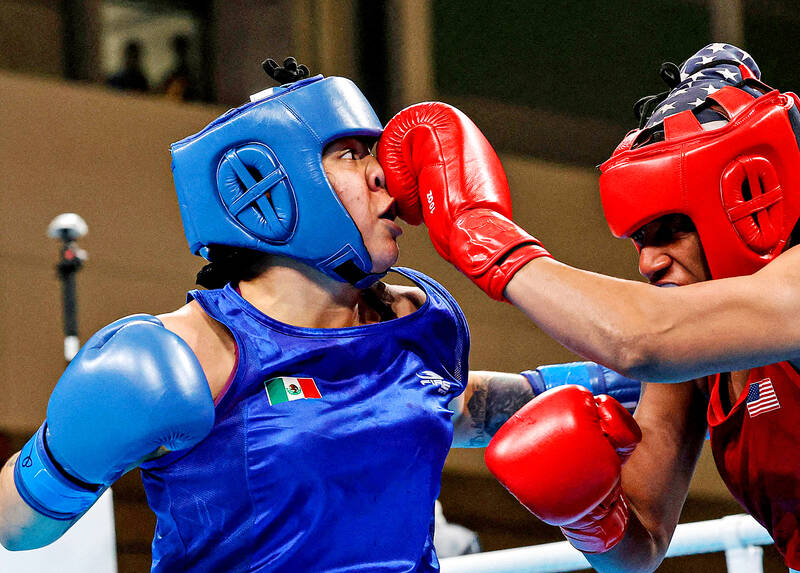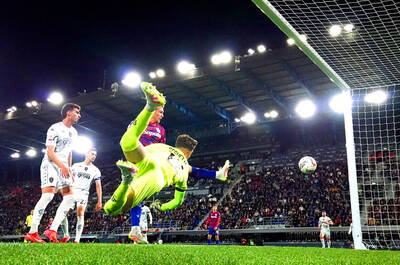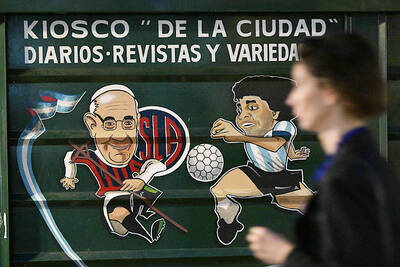Workers and volunteers at the Pan American Games were still removing bricks, pieces of wood and construction machinery from outside competition venues on Tuesday, the fourth day of the largest multisport event in the region.
Construction material is scattered around many of the entrances to the National Stadium compound, where six venues are set to stage 30 events at the Pan American Games in Santiago.
Chile is hosting the Olympic-style event for the first time and public officials have invested US$507 million in the area.

Photo: AFP
Near the stadium’s main entrance, dozens of empty boxes, crates and pieces of wood were untouched on Friday, the day of the opening ceremony, and Saturday.
Some of those leftovers were linked to the last-minute installation of rootless trees, two volunteers said, speaking on the condition of anonymity because they were not authorized to speak to journalists.
One of the workers continued cleaning and picking up trash while two local police officers dressed in green, known as carabineros, watched from one of the entrances to the compound.
A lack of volunteers and signage around Pan American Games venues has left many fans struggling to find their way to and around the National Stadium area.
Mexican fan Luis Miguel Cruz, a 56-year-old engineer, attended the 2011 Pan American Games in Guadalajara and has been disappointed by the lack of organization this year in the Andean nation.
“I am a bit frustrated. It was hard to get here from downtown, I didn’t know where to get the right subway. I didn’t know which entry to use here and neither did the first volunteer I found,” Cruz said, as he ate a hot dog from a food truck at the National Stadium. “In Guadalajara, the food truck was exceptional, there were many places to sit, a lot of variety. Here it is small, few seats, too.”
The athletes village has also faced problems, as it does at many Pan American Games. Some have complained about a lack of hot water in their showers and long lines to eat.
Last week, more than 1,300 keys to bedrooms in the athletes village were not properly identified. They had to be tested one by one, which stalled the arrival of several competitors.
Local media reported last week that that leaks at the athletes village forced several members of the Argentine, Brazilian and US delegations to momentarily move into a hotel.
Pan American Games organizers did not respond a request for comment.
Some of the problems found by athletes in the past few days were expected long before the Games. Colombian diver Mariana Osorio said the distance between the athletes village and the aquatics center was excessive.
“It took us an hour to get there. Sometimes you arrive with back pains, and you’re just going there to compete,” Osorio said. “It is not ideal.”
Organizers have managed to avert the most serious risk to the Games so far. A broken water pump could have left Santiago’s pool half-empty, but it was fixed in time.
Now the race is on to get everything ready for track and field, which starts on Sunday.

Bologna on Thursday advanced past Empoli to reach their first Coppa Italia final in more than half a century. Thijs Dallinga’s 87th-minute header earned Bologna a 2-1 win and his side advanced 5-1 on aggregate. Giovanni Fabbian opened the scoring for Bologna with a header seven minutes in. Then Viktor Kovalenko equalized for Empoli in the 30th minute by turning in a rebound to finish off a counterattack. Bologna won the first leg 3-0. In the May 14 final in Rome, Bologna are to face AC Milan, who eliminated city rivals Inter 4-1 on aggregate following a 3-0 win on Wednesday. Bologna last reached the

If the Wild finally break through and win their first playoff series in a decade, Minnesota’s top line likely will be the reason. They were all over the Golden Knights through the first two games of their NHL Western Conference quarter-finals series, which was 1-1 going back to Minnesota for Game 3 today. The Wild tied the series with a 5-2 win on Tuesday. Matt Boldy had three goals and an assist in the first two games, while Kirill Kaprizov produced two goals and three assists. Joel Eriksson Ek, who centers the line, has yet to get on the scoresheet. “I think the biggest

From a commemorative jersey to a stadium in his name, Argentine soccer organizers are planning a slew of tributes to their late “Captain” Pope Francis, eulogized as the ultimate team player. Tributes to the Argentine pontiff, a lifelong lover of the game, who died on Monday at the age of 88, have been peppered with soccer metaphors in his homeland. “Francisco. What a player,” the Argentine Football Federation (AFA) said, describing the first pope from Latin America and the southern hemisphere as a generational talent who “never hogged the ball” and who showed the world “the importance of having an Argentine captain,

Noelvi Marte on Sunday had seven RBIs and hit his first career grand slam with a drive off infielder Jorge Mateo, while Austin Wynn had a career-high six RBIs as the Cincinnati Reds scored their most runs in 26 years in a 24-2 rout of the Baltimore Orioles. Marte finished with five hits, including his eighth-inning homer off Mateo. Wynn hit a three-run homer in the ninth off catcher Gary Sanchez. Cincinnati scored its most runs since a 24-12 win against the Colorado Rockies on May 19, 1999, and finished with 25 hits. Baltimore allowed its most runs since a 30-3 loss to